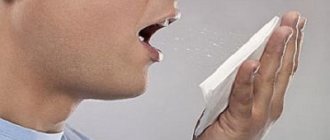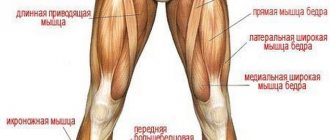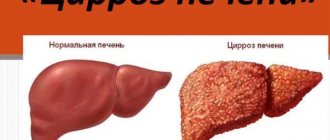Sore throat, discomfort when swallowing are familiar symptoms that occur with various diseases.
It does not always indicate a cold or bacterial infection, especially when there is a sore throat when swallowing without fever or severe inflammation.
In most cases, discomfort when swallowing is a sign of a cold, but the pathology is not always infectious in nature. In smokers, pain when swallowing and speaking can be caused by irritation of the superficial epithelial layer of the larynx and vocal cords, which are responsible for the tone and timbre of the voice. Even poor oral hygiene can lead to pain, so there is no need to start treatment until the exact cause of the discomfort is determined.
It is worth knowing about the most common causes of discomfort when swallowing and the simplest and most effective ways to solve the problem.
Causes of sore throat
Unpleasant symptoms when swallowing most often occur with the following diseases:
- Viral infection (ARVI), as evidenced by a runny nose, hoarseness, and nonproductive cough;
- Bacterial (most often streptococcal) infection of one of the tonsils, which can be assumed by enlarged lymph nodes in the neck, in the chin area, behind the ear;
- Acute pharyngitis - allergic, toxic or nutritional (due to products entering the body) genesis; Chronic pharyngitis - catarrhal, granulosa or atrophic form;
- In patients 18–30 years old – eruption of additional molars (“wisdom teeth”);
- Radiating pain from cervical osteochondrosis;
- Neurotic pain;
- Irritation of the pharynx or larynx by toxic substances (cigarette smoke, hazardous industrial emissions, etc.);
- Manifestation of sexually transmitted infections (syphilis, gonorrhea), often occurring at normal temperatures in the initial stage;
- Injuries - thermal and chemical burns, ingress of foreign objects (fish bones, glass fragments, etc.), unsuccessful surgical interventions (tracheotomy or tonsillectomy):
- Development of a benign or malignant neoplasm.
Most often, a sore throat that gets worse when swallowing is caused by a viral or bacterial infection. The pathological pathogen enters the mucous membranes of the oropharynx through airborne droplets or household routes, settles there and begins active life. The appearance of tickling, pain, change in voice and coughing indicates the accumulation of toxins produced by pathogenic flora during growth and reproduction.
If your throat hurts and it hurts to swallow, but there is no fever: what is it?
With inflammatory damage to the mucous membrane and lymphatic tissue (palatine tonsils) of the oropharynx, a sharp or aching pain occurs; upon examination, a red throat is revealed (due to reflex dilatation of blood vessels) and in some cases - rashes, plaques and ulcerations.
Sometimes, with the pathological processes described above, there is no temperature. This may be due both to the specifics of the disease and to an inadequate response of the thermoregulatory center.
Let's look at the reasons why your throat hurts and it hurts to swallow without fever and what it could be:
- Asymptomatic or latent treatment of infectious pathology (bacterial or viral tonsillitis, tonsillitis).
- Gingivitis and stomatitis of a viral, fungal nature.
- Specific infectious processes for which this localization of inflammation is rare and atypical (primary syphilis, gonorrhea, mycoplasma or ureaplasma pharyngitis).
- When there are no cold symptoms, but there is pain when swallowing, you should also not forget about foreign bodies. They come from food, during games, or as a result of improper use (fish bones, toothpicks, needles, small nails).
- Injury to the oral mucosa by a cutting or piercing object resulting from a burn.
- Allergic reaction to food, tobacco smoke; manifestations of autonomic dysfunction syndrome.
- Reflux esophagitis, angina pectoris, neuralgia, tumor process.
Thus, there are many reasons for such complaints,
but all of them require a scrupulous collection of the patient’s medical history, the appointment of laboratory and instrumental methods of treatment, as well as a thorough differential diagnosis.
First aid at home
What should be the treatment before seeking help from a specialist? To reduce discomfort when swallowing, first of all, you need to eliminate factors that contribute to irritation of the mucous membranes. To do this you need:
- stop smoking and drinking alcohol;
- exclude from the diet foods that irritate the throat - spicy foods, citrus fruits, seeds, etc.;
- drink at least 1.5 liters of warm drink in the form of herbal teas and decoctions;
- talk less so as not to overstrain the vocal cords;
- Avoid drafts and hypothermia.
Mechanical injury to the mucous membranes and hypothermia reduces local immunity, which stimulates the proliferation of opportunistic microorganisms in the oropharynx.
Local manifestations of the disease can be quickly eliminated by undergoing complex therapy aimed at eliminating pathogenic viruses and bacteria, as well as increasing the body’s resistance.
When you can handle it on your own
To cope with pain without going to the clinic, you need to take action at the first manifestation of a symptom. If you feel unwell and have a fever, you are allowed to take an antipyretic medicine.
After heavy strain on the vocal cords, drinking plenty of fluids will not hurt. It is permissible to gargle with a warm antiseptic.
It is important to understand that painkillers only temporarily relieve unpleasant symptoms; they do not cure the disease. Therefore, if there is severe discomfort that does not go away for a long time, it is unlikely that you will be able to cope with the disease on your own.
In what cases should you consult a doctor?
You should not delay going to the doctor if:
- sore throat for more than 48 hours;
- the temperature rose sharply;
- the general condition of the body has worsened;
- it is unpleasant to move your jaws;
- pus or plugs are visible on the back of the larynx.
An ambulance will be needed if it is impossible to swallow saliva and it flows out of the mouth, breathing is difficult, and a whistle is heard.
TOP 7 drugs for quick treatment of sore throat
Depending on the cause of the sore throat, the patient is prescribed antiviral or antibacterial drugs.
- In case of reflux and autonomic dysfunction syndrome, lozenges are used more for the purpose of distraction therapy.
- For sore throat, for example, it is important to prescribe the right antibiotic or effective antiviral drug, as well as use effective local antiseptics and painkillers.
- For stomatitis, in addition to etiotropic drugs, regular mouth rinses are also used. If you have a local allergic reaction in the throat area, before the ambulance arrives, you can rinse your mouth with a solution of adrenaline diluted in a glass of water.
How to treat a sore throat with local medications, TOP 7 drugs for a sore throat without fever:
- Anti-Angin is a medicine for local use, which is both an anesthetic and an antiseptic. Helps well with pharyngitis, tonsillitis, stomatitis. The maximum daily dose is 6 lozenges (with an interval of 2-3 hours between doses).
- Strepsils Intensive is an effective pain reliever that is used for symptomatic treatment. Available in the form of lozenges with different flavors. Adult patients and children over 12 years of age are recommended to consume no more than 5 pieces per day (after meals).
- Grammidin Neo with anesthetic is an effective lozenge for pain in the oropharynx. In addition, the drug has anti-inflammatory and antimicrobial effects. The drug is contraindicated for a child under 4 years of age. You need to take one tablet 3-4 times a day.
- Inhalipt is available in aerosol form. Contraindicated during pregnancy and children under 3 years of age. One or two injections are prescribed after meals 3-4 times a day.
- Rotokan is a syrup consisting of a concentrate of various medicinal herbs. Contraindicated in case of individual intolerance to its components. Used for rinsing three times a day, always after meals.
- Lollipops Tantum Verde - has analgesic, antimicrobial, antifungal and antiseptic effects. The medicine is prescribed for complete absorption in the oral cavity 3-4 times a day, one lozenge.
- Chlorophyllipt solution is a medicine created on the basis of eucalyptus leaves, due to which it has powerful antibacterial and anti-inflammatory properties. As a result of its use, pain and sore throat goes away.
What else to pay attention to
It is impossible to make a diagnosis based only on the nature of the pain. There are a number of other signs to consider. For example,
- redness of the pharynx, tonsils, palatine arches appears with tonsillitis, pharyngitis;
- plaque is characteristic of bacterial tonsillitis, pharyngomycosis, the appearance of pus is noted with an abscess, scarlet fever, mucus - with measles and rubella;
- the formation of a grayish-white film that cannot be removed with a spatula is characteristic of diphtheria;
- a rash appears with scarlet fever, rubella, measles, mononucleosis;
- Hoarseness, dry cough, difficulty breathing may indicate laryngitis, tracheitis, epiglottitis.
Often, one or another symptom can occur in several diseases. For example, plaque can appear with pharyngomycosis, tonsillitis, and diphtheria. The disease can only be correctly determined through laboratory testing.
What to gargle with?
Treatment of a sore throat is carried out mainly with the following types of medications:
- “Iodinol” – destroys pathogenic viruses and bacteria, helps eliminate catarrhal and purulent processes in the respiratory organs;
- “Chlorhexidine” – disinfects the mucous membrane of the oropharynx and prevents the development of pathogenic microbes and bacteria;
- “Miramistin” – inhibits the reproductive activity of yeast-like fungi, gram-positive and gram-negative bacteria;
- “Rotokan” – accelerates the regeneration of tissues affected by inflammation, has a hemostatic and anti-edematous effect;
- "Furacilin" - accelerates the regression of purulent-inflammatory processes provoked by the development of bacteria and fungi.
Rinsing the oropharynx is one of the most effective ways to eliminate inflammatory processes in the respiratory system. To carry out sanitizing procedures, it is recommended to use medications that have anti-edematous, local anesthetic and anti-inflammatory effects.
Folk remedies
When there is a sharp pain in the throat, medications are not always at hand. Auxiliary therapy is traditional methods of treatment.
The following are popular among them:
- Milk with honey. Before starting treatment, you must make sure that the patient is not allergic to honey. One teaspoon of liquid or solid honey should be added to a medium cup of warmed, but not boiled, milk and drunk slowly.
- Rinse with saline solution. Add 0.5 tsp to 1 glass of warm boiled water. salt, 1 drop of iodine and 2-3 drops of pre-diluted potassium permanganate. The color of the prepared mixture is pale pink. Excessive zeal in the use of iodine and potassium permanganate can lead to the opposite effect - a burn of the mucous membrane.
- Apple-honey composition with onions. One large onion is finely chopped and soaked in a glass of apple cider vinegar for a day. After 24 hours, add a glass of liquid honey to the liquid and stir until smooth. The resulting product is filtered and taken on an empty stomach daily, 2 tablespoons.
- Infusion of chamomile. 1 tbsp. l. dried flowers, pour 200 ml of boiling water, leave for 15 minutes. Strain. Gargling 3-5 times a day soothes a sharp sore throat.
- Milk with onions. The milk is brought to a boil and cooled slightly. At this time, one medium-sized onion is chopped into very small pieces. The onion mixture is poured with still hot milk, wrapped in a towel and left for an hour and a half. For consumption, the liquid is heated and drunk in small sips (a glass in the morning and evening).
- Tea with raspberry jam, honey, chamomile, thyme, St. John's wort, lemon. Drinking plenty of tea, which has antiseptic and sedative properties, has a beneficial effect on the mucous membrane, relieving negative symptoms.
You should not rely only on the effect of folk remedies. Their use for treating the throat and eliminating pain when swallowing is appropriate as an addition to the main course of therapy.
Which doctor should I contact for treatment?
When it hurts to swallow, but there is no temperature, you need to visit a number of specialists who will help recognize the problem:
- ENT doctor. He will examine the throat and other ENT organs and confirm or rule out the presence of pathology in the pharynx itself. This doctor will recognize pharyngitis, laryngitis or tonsillitis and make sure that there are no tumors in this area.
- Neurologist. He will check the condition of the cervical spine and, if necessary, prescribe an MRI and X-ray of the neck to find out the nature of the problem.
- Endocrinologist. The thyroid gland is being examined. For atypical pain in the throat and neck, he refers you for an ultrasound of the thyroid gland and for donating blood for hormones.
- Gastroenterologist. Checks the patient for GERD, may recommend performing fibrogastroscopy of the stomach, and then selects a treatment regimen.
- Dentist. To exclude problems with teeth, oral cavity, tongue and temporomandibular joints.
- Allergist. If you suspect an allergic nature of the disease.
The patient does not necessarily need to see all the doctors; sometimes at the very first stage, the ENT doctor sees where the problem is and selects a treatment regimen. In the case of an atypical disease, consultation with several specialists and additional research may be necessary to recognize the disease.
Diagnostics
In order to prevent the development of all kinds of complications, you need to seek advice from the therapeutic department when the first signs of pain appear in the oropharynx area. After completing an initial examination of the patient and collecting anamnesis, the doctor will prescribe examinations and various tests to make an accurate diagnosis.
Among them:
- fluorography of the thoracic region;
- HIV test;
- manometry - to identify problems with the esophagus;
- throat swab to determine microflora;
- measuring the level of acidity in the esophagus;
- general urine and blood tests.
Possible complications
If a sore throat occurs due to infection with viruses or bacteria, you need to start therapy on time. Otherwise, there is a risk of infection of other organs. As a result, the following complications develop:
- Pneumonia is a consequence of an untreated acute respiratory viral infection.
- Sore throat - can cause kidney failure, heart pathologies and joint damage.
- Sinusitis - can appear in the absence of adequate treatment for throat diseases.
- Bronchitis - with a protracted process, there is a risk of chronicity.
- Otitis – when the respiratory system is affected, the ears are often affected.
Forecast
For inflammations and infections of the throat, the prognosis in most cases is favorable if properly treated. To prevent the disease from developing again, it is important to follow preventive measures, general hygiene and sanitize the oral cavity.
An unfavorable prognosis is observed when complications occur in other organs and systems. The patient must complete the course of treatment and be regularly monitored by a doctor.
Possible complications
People who have suffered from illnesses such as tonsillitis and tonsillitis continue to lead normal lives, subject to high-quality and timely treatment. In rare cases, complications cause disability. The most common consequences are :
- otitis media;
- swelling of the larynx;
- suppuration (retropharyngeal abscess).
If the disease is treated incorrectly, it will become chronic. A person will constantly be bothered by ailments and impaired immunity.
A severe form of the disease can affect the overall functioning of the body. If the progression of inflammation is not stopped in time, death is possible.
Common causes of complications of throat diseases are:
- refusal to take medications;
- choosing the wrong dosage of medication;
- presence of concomitant infections;
- weakened protective function;
- late therapeutic effect;
- using only folk remedies.
After removing a foreign body from the pharynx, a person may encounter an infection that can cause a retropharyngeal abscess. Therefore, after successfully eliminating the item, it is important to follow all the doctor’s recommendations.
The organs of each person react individually to any processes, and the consequences of diseases can unexpectedly develop into serious problems.
Prevention
To avoid painful sensations in the larynx, you need to be sensitive to your health and engage in restorative procedures:
- Hardening;
- Food rich in vitamins and microelements;
- Physical activity;
- Staying in the fresh air;
- Rejection of bad habits;
- Full sleep;
- Avoiding stressful situations.
The causes of sore throat are very diverse and can be a symptom of serious diseases. If the pain when swallowing does not go away on the third day and home remedies cannot cope with it, you should contact the clinic. The doctor will help you choose an effective treatment and get rid of throat discomfort in a short time.
Pharyngitis in adults Follicular tonsillitis Retropharyngeal abscess Tonsillitis Purulent tonsillitis Lacunar tonsillitis
Video
We treat a throat quickly and effectively in 2 days
If you start treating your throat as soon as it starts to hurt and feel sore, you can achieve a quick recovery.
An effective quick method will help: steam inhalation with herbal decoctions . It perfectly kills germs and moisturizes the mucous membrane of the throat, which is dry due to inflammation. Hot can only be done if there is no temperature.
You can also do cold inhalation, inhaling essential oils with an antiseptic effect (tea tree oil, sage, juniper, lemon).











